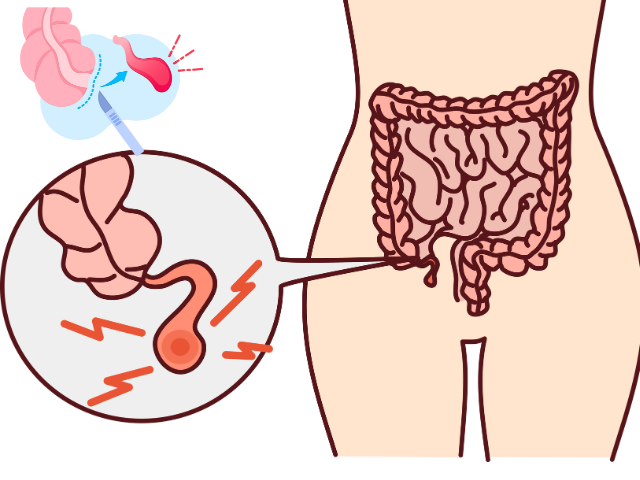Appendicitis can affect individuals of all ages, causing sudden pain and requiring immediate medical attention. At KK Virat Hospital, Karimnagar, we offer minimally invasive laparoscopic appendectomy, ensuring a quick recovery and minimal discomfort. If you experience persistent pain in the lower right abdomen, seek expert care today.
What is an Appendectomy?
Appendectomy is a surgical procedure to remove an inflamed or infected appendix. It is performed to treat acute appendicitis, a condition where the appendix becomes swollen and filled with pus. If left untreated, the appendix may rupture, leading to life-threatening infections. Laparoscopic appendectomy is the preferred treatment due to its minimally invasive nature, shorter recovery time, and reduced risk of complications.

Why is Timely Treatment Important?
If appendicitis is left untreated, the appendix may burst, spreading infection throughout the abdomen. This can lead to serious complications such as:
- Peritonitis: A life-threatening infection in the abdominal lining.
- Abscess Formation: Pockets of infection around the appendix.
- Sepsis: A severe infection that spreads throughout the bloodstream.
Early diagnosis and surgical removal of the appendix prevent these complications and ensure a full recovery.
Types of Appendicitis Surgery
1. Laparoscopic Appendectomy (Minimally Invasive Surgery)
- Small incisions instead of a large abdominal cut.
- Faster recovery and minimal post-operative pain.
- Reduced risk of infection and less scarring.
- Same-day discharge in most cases.
2. Open Appendectomy (Traditional Surgery)
- Used when laparoscopic surgery is not feasible due to complications.
- Recommended for severe cases such as a ruptured appendix.
- Requires a larger incision in the lower right abdomen.
- Longer hospital stay and recovery period.
Diagnosis of Appendicitis
Our specialists at KK Virat Hospital conduct a thorough diagnosis, including:
- MRI – Used in special cases, such as for pregnant women.
- Physical Examination: Checking for abdominal tenderness and pain location.
- Blood Tests: Detecting signs of infection (high white blood cell count).
- Urine Test: To rule out urinary tract infections or kidney stones.
- Imaging Tests:
- Ultrasound – First-line imaging test for appendicitis.
- CT Scan – Provides a detailed view of the appendix and surrounding organs.
How is Laparoscopic Appendectomy Performed?
- The patient is given general anaesthesia to ensure a painless procedure.
- Three small incisions are made in the abdomen.
- A laparoscope (tiny camera) is inserted to visualize the appendix.
- The appendix is detached and removed using surgical instruments.
- The incisions are closed with sutures or surgical glue.
If complications arise, such as a ruptured appendix, the surgeon may switch to an open appendectomy.
How to Prepare for an Appendectomy?
- Fasting for at least 8 hours before surgery.
- Inform your doctor about any medications you are taking.
- Stop blood thinners, aspirin, and vitamin supplements before surgery.
- Undergo necessary pre-operative tests, including blood work and imaging.
- Shower before the procedure as the surgical area should remain dry after surgery.
Recovery After Laparoscopic Appendectomy
- Patients can usually go home the same day or within 24 hours.
- Mild abdominal pain and discomfort are normal for a few days.
- Avoid heavy lifting and strenuous activities for at least 2 weeks.
- Follow a soft diet to prevent constipation and aid digestion.
- Keep the surgical area dry and clean to prevent infections.
Benefits of Laparoscopic Appendectomy
- Smaller incisions, reduced pain, and faster healing.
- Lower risk of infections and post-operative complications.
- Quicker return to normal activities compared to open surgery.
- Minimal scarring leads to better cosmetic results.
Appendicitis Treatment Without Surgery
- In some cases of chronic appendicitis, antibiotics can help manage symptoms.
- However, surgery remains the only permanent solution for acute appendicitis.
Appendix Surgery Recovery Time
- Most patients recover fully within 1 to 3 weeks.
- Patients can resume normal work within a week following post-surgical guidelines.
- No risk of recurrence as the appendix is completely removed.
Why Choose KK Virat Hospital for Appendicitis Treatment?
- Experienced Laparoscopic Surgeons: Specializing in advanced appendix removal techniques.
- State-of-the-Art Facilities: Equipped with the latest technology for minimally invasive procedures.
- Faster Recovery and Minimal Scarring: Compared to traditional open surgery.
- Comprehensive Post-Surgical Care: Ensuring smooth and safe recovery.
Your Health, Our Priority – Book Your Consultation Today!
If you are experiencing symptoms of appendicitis, do not delay seeking medical attention. Visit KK Virat Hospital, Karimnagar, for expert diagnosis and minimally invasive laparoscopic surgery. Contact us today to book an appointment and ensure a pain-free, quick recovery!
- Call Us Directly: Get in touch with our medical coordinators to schedule an appointment with an expert urologist.
- Direct Visit: You can visit our hospital directly by carrying your previous medical records if you have a medical history. However, admission will be based on the doctor’s recommendation.
What is the quickest way to get rid of appendicitis?
The fastest and most effective treatment for appendicitis is surgical removal (appendectomy). In some mild cases, antibiotics may provide temporary relief, but surgery is the only permanent cure.
Is it possible to treat appendicitis without surgery?
In rare cases, mild appendicitis can be managed with antibiotics, but this is not a guaranteed cure. Surgery is recommended to prevent rupture and life-threatening complications.
How long do you have to stay in the hospital after appendix removal?
For laparoscopic appendectomy, most patients go home the same day or within 24 hours. Open surgery may require a 2-3 day hospital stay.
Is appendix surgery painful?
During the surgery, patients feel no pain due to anaesthesia. Mild pain after surgery is common and can be managed with painkillers.
When can I walk after the appendix surgery?
Most patients can walk within 6-12 hours after surgery. Walking helps reduce bloating and improve circulation.
How do I poop after an appendectomy?
You may experience mild constipation. Drink plenty of fluids, eat fibre-rich foods, and take stool softeners if necessary.
Is appendix removal covered under health insurance?
Yes, most health insurance policies cover appendix surgery, but it’s best to check with your provider for specific coverage details.


